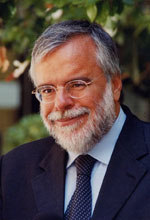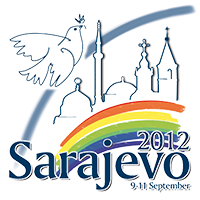
Fondateur de la Communauté de Sant’Egidio
|
It is not easy to live together for people who are different from each other. This challenge arises in many places: it causes great sufferance. Yet, at length it has been said that all human beings are equal. The Declaration of Independence of the United States of America, which has been quoted endlessly, stated: "We hold these truths to be self-evident, that all men are created equal, that they are endowed by their Creator with certain unalienable rights, that among these are life, liberty and the pursuit of happiness...".
This belief was proclaimed by the Declaration of Human Rights of 1948, which states: "All human beings are born free and equal in dignity and rights". If equal, however, why is it so hard to live together? This proclaimed equality actually sounds more like an abstraction.
Human beings are different, in terms of ethnic background, or religion. They are proclaimed equal, yet they feel different. At the bottom of their identity there seems to be a destiny enscribed: the difficulty, sometimes the impossibility, to live together. Many of us, because we are here in Sarajevo, will believe that I am referring to the history of Bosnia and Herzegovina. Not only. Living together among people who are different from each other, unfortunately, is not a problem limited to this beautiful land. It is a global challenge, a universal issue.
In many corners of the world, violence has taken hold of hearts and minds, it has produced tragedies among people who felt irremediably different, perceiving the others as a threat. In these instances, coexistence has turned into hell. The British Rabbi, Jonathan Sacks has written: "The virus of hatred may seem asleep for a while, but it is hard to die... thus friends turn into enemies, neighbours into contenders". People discover to be different, and hate each other.
How is living together possible after such tragedies? In leaving the Memorial of the massacres in Kigali, in Rwanda, I felt this question rise within me: "How will they live together after what has happened?" Diversity often leads to divorces, walls, the exodus of populations.
For long centuries, on the contrary, Sarajevo was a city of coexistence among Muslims, Orthodox Christians, Roman Catholics and Jews. They lived together. Grand Mufti Ceric spoke of a common heritage among different people. An inhabitant of Sarajevo remembers the atmosphere of that living together: "I have lived for forty years in the same district... a few steps away from an old Orthodox church and a 16th century mosque. And uphill, a few steps from my home, was the Catholic seminary. Before the war this harmony, that stemmed from difference, was part of everyday life...".
At the beginning of the 20th century Sarajevo was a tranquil city; then the world all of a sudden turned its attention to it, after the attack that ignited World War I. Then, history surged forward, rough and violent, from Sarajevo. Many people, and rightly so, have written that the history of the 20th century is marked by Sarajevo: here it started and here it ended. Three terrible wars were fought in this land (and a generation has been through all three of them). In spite of itself, through immense suffering, Sarajevo has become a symbol of our days.
We are aware that the communities of Bosnia and Herzegovina do not agree on the interpretations of the sorrowful and recent events of war. We must be honest. Memories are different. But they are all haunted by sorrow. All have suffered. Sorrow is enscribed in the hearts and minds of many elderly people and adults. The sorrow of all mothers is the same: it unites different memories.
No one will overlook the value of this meeting in Sarajevo, among people of different religions and different memories, but who have all been through deep suffering. We all grasp the extraordinary meaning of this meeting among religious leaders, and peoples, of Bosnia and Herzegovina: Muslims, Orthodox, Roman Catholics and Jews. We all grasp the significance of the coming to Sarajevo of His Holiness Patriarch Irenej, whom I greet with great respect. The relevant presence of these people shows that religions do not want to be exploited to sacralize barriers between different communities.
Ours is a meeting made even more extraordinary by the presence of men and women of different faiths coming from all over the world, gathered in the spirit of Assisi. The coming together of so many different believers does not respond to a politically correct practice of dialogue. We are not tired of living these meetings, city after city, and every year since 1986: we believe dialogue is crucial to build a true civilization in a globalized world.
In Sarajevo we understand the effort required to live together among people who are different. I remember that Cardinal Puljic, in our Interfaith Meeting in Milan in 1993, spoke as a witness of an ongoing war: "How hard it is to simply utter this word, 'peace', where the only word is the bursting of bombs, the crying of the wounded, the torment of hunger, the despair of people who feel they are abandoned by God and man". John Paul II, who had been through war and the Shoah, used to teach: whoever has lived war can bear a better witness to the value of peace. Whoever has suffered war, understands the value of dialogue.
The fact that representatives of different religious worlds have convened here together, reveals how, in the depth of religions, a message of peace is born, grounded in the different religious traditions. The togetherness of children of different faiths expresses - like in a liturgy - the value of dialogue, the path towards peace. Religions to not sacralize war, even though this has happened in the past. Only peace is holy, not war.
Peace is not a banal or generic word: it is a word strongly connected to God himself. To say “peace” in Sarajevo gives it a grave and binding significance. The religious leaders of this land know that peace is a painful word, but it is also the yearning of their people, as well as a gift of God.
Since 1986, John Paul II, in a world still marked by the cold war, reasserted the unbreakable bond between religions and peace. For this reason, in 1986, he summoned the religious leaders to Assisi to pray together for peace: "More perhaps than ever before in history - he said - the intrinsic link between an authentic religious attitude and the great good of peace has become evident to all". In this spirit (this has been the commitment of the Community of Sant'Egidio) we have walked, year after year, since 1986, in many cities of the world, convinced that the spiritual dimension is crucial in overcoming war, ethnicism, fundamentalism and fanaticism. An authentic religious attitude, and peace, are connected to each other. But it is necessary to show, even physically, that people who are different are together.
A companion of our path since 1987, Cardinal Carlo Maria Martini, who passed away a few days ago - and I turn to this great teacher in grateful thought - said at the end of the meeting in Milan in 1993:
"... from the coming together of different religious paths, comes a great help to move in a less self-centered fashion, more capable of grasping the complexity of life and of the world. We become also more capable of seeking, together, the solutions to impossible conflicts. There is no future in war... There is no hope that wars will be silent unless the heart of man changes. There is no strength more powerful that the weakness of prayer".
Prayer is a humble and powerful strength. This is why our meetings are embedded in prayer. There is great value in the meeting of women and men of religion, when a liturgy of friendship and of dialogue takes place, when people pray one beside the other. Indeed, one beside the other, and never again one against the other, such as happened in the past! To be together, then, becomes a prophecy and an indication of a world of peace, delegitimizing ethnic clashes, as well as clashes of civilizations and of religions: this is the civilization of living together.
In more than 25 years along the path of the spirit of Assisi, we have experienced how spiritual strength fosters true peace. It is a weak strength, that has neither weapons nor resources, but it is real nonetheless and, in its own way, powerful. Religions change men and women from within, giving rise to a peaceful attitude. They speak to women and men, starting from everyone's conscience. An Islamic mystic, Jalal al Din Rumi, wrote: "The first struggle is with oneself, purifying one's nature. Begin with yourself". A wise Jew, Martin Buber, taught: "The Archimedean point from which I can raise the world is the changing of my own self". Men and women who change themselves, change the world and establish peace. This is what is needed in our daily lives, as well as in politics.
Different people will be mixing more and more with each other. Frontiers will not stop the movements of history, accelerated in the era of globalization: different peoples grow closer and start living together. Emigration is proof to this movement of approach, which has created in Europe (and not only) unprecedented stories of coexistence, unthought-of neighbourhood relations. Human beings, driven by necessity and by history, go and live close to others. Are these coexistences dangerous then? Are they destined to tragic divorces or permanent conflict? Living together must become a destiny of peace.
Creating this future is the great task of religions, who teach how, to the eyes of God, men and women are equal, and their diversity does not change their equality in humankind. Men and women are, at the same time, equal and different. Religions are aware of this, and must tell it to the ears of every man and every woman, and to the hearts and minds of peoples. We say this, being a caravan of humble experts in humanity. We say this and live it in Sarajevo, with the help of so many of our friends. We live it in the construction of Europe, which was born from believers, and which is represented here by men of value and spirit, such as President Van Rompuy and President Monti.
John Chrisostom expressed the dream of religions: "Let us then show a new life; let us make earth a heaven...". It is a challenge posed to believers. Through the quality of human life, earth can be transformed. Neither with the heavens of ideologies, nor through revolutions. Indeed religions teach how to live that keyword that is responsibility: a personal word, fearsome, dynamic, creator of immense energies.
We have suffered tragedies, but we have gone a long way, as we see from the beautiful image of believers gathered here together. We have started to encounter different peoples in a more humane way. Religions may help us grow in this more humane knowledge. As Patriarch Athenagoras, who had been through the World War in the Balkans, said, I quote:
"I have met the Slavs. I have observed the Germans and the Austrians. I have lived... with the French. All peoples are good. Each deserves respect and admiration. I have seen men and women suffer. They all need love. If they are evil, it is because they have never met true love... I also know there are darker, demonic forces, which sometimes seize men and peoples... But the love of God is stronger than hell".
Religions witness all of this. The future will make us geographically closer. We need to prepare to be close spiritually, because we are so different, yet so similar. If one does so, living together in peace will be the future.
|

